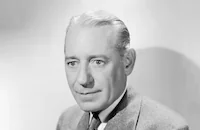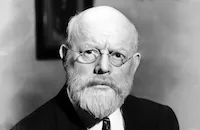Lucky Night

Brief Synopsis
Cast & Crew
Norman Taurog
Myrna Loy
Robert Taylor
Joseph Allen
Henry O'neill
Douglas Fowley
Film Details
Technical Specs

Synopsis
Cora Jordan, daughter of steel magnate Calvin Jordan, longs for excitement in a man. To find it, her father counsels her to surrender her cloistered life, leave the luxury of her home and find a job. Cora takes his advice and begins a futile job hunt. Taking refuge from rejection, Cora retreats to a park bench, where she meets fellow job seeker Bill Overton. The broke twosome steal a nickel from a lunchcounter and parlay it into a wild night of gambling and drinking. Awakening the next day, Cora and Bill are stunned to discover that their previous night's revelry has also included a marriage ceremony. In the face of her father's skepticism, Cora determines to make a success of her marriage. The couple settle down into a three-room apartment, where Cora abruptly abandons her ideas of excitement for the principles of security, thus putting herself in conflict with her fun-loving husband. Bill finally gets a job as a paint salesman, but the couple discover that life is decidedly unglamorous on thirty-five dollars a week. Bill's ten-dollar-a-week raise, rather than reconciling the couple, splits them apart when they argue over how to spend the money. Deciding that their goals are irreconcilable, Cora returns home to her father, where Bill comes to visit her. Cora has gone out for the night, hoewever, and in her absence, Bill and his father-in-law get drunk together. Mr. Jordan then makes Cora realize that Bill is the man she had always dreamed of, and the couple are reconciled.

Director

Norman Taurog
Cast

Myrna Loy

Robert Taylor

Joseph Allen

Henry O'neill

Douglas Fowley
Bernard Nedell

Charles Lane
Bernadene Hayes
Gladys Blake

Marjorie Main
Edward Gargan

Irving Bacon
Oscar O'shea
Lillian Rich
Carl Stockdale
Jessie Arnold
Charles Dorety
George Cooper
Jack Daley
C. L. Sherwood
Hal Price
Donald Kerr
Frank Faylen
Garry Owen

Lee Phelps
Baldwin Cooke
Bobby Watson
Raymond Kelly

John George

Howard Mitchell
Richard Cramer

Fern Emmett
Henry Roquemore
Barbara Norton
Josephine Whittell
Frank Coghlan Jr.
Wilson Benge
Louis Natheaux
Al Thompson
Harold Schlickenmayer
Crew
Peter Ballbusch
John S. Detlie
Dave Friedman
Cedric Gibbons
Robert Golden
Grover Jones
Ray June
Vincent Lawrence
Louis D. Lighton
Douglas Shearer
Dolly Tree
Elmo Veron
Franz Waxman
Edwin B. Willis

Videos
Movie Clip


Trailer
Film Details
Technical Specs

Articles
Lucky Night
Perhaps the critical and commercial failure is why Lucky Night marked the only screen pairing of Myrna Loy and Robert Taylor. The story clearly wants to be another It Happened One Night (1934): Loy plays a bridge magnate's unhappy daughter who leaves the lap of luxury to try and find love on her own. Now penniless, she meets cute with the actually penniless Taylor on a park bench, and from here, they start reaping lucky windfalls. They hit jackpot after jackpot -- a new car, a large reward for capturing a bandit, and so on. Critics seemed to agree that while the first portion of the film is exciting and well-paced, things quickly become overly talky.
Loy, in her autobiography, called Lucky Night "a lame bit of whimsy.... Our first day on the set I played records, which we did sometimes to fill those endless waits between shots.... I was listening to some wonderful Cuban music when Robert Taylor approached: 'Do you have to play that sexy stuff all the time? It's the dirtiest music I ever heard.' That was my first day with him. I thought, 'Oh, brother!'
"He was a bit stuffy, but we got along all right -- during the picture, that is; later on I didn't get along with him [when he named names to the House Un-American Activities Committee in 1947]. Come to think of it, he acted somewhat deviously on Lucky Night. He was engaged to Barbara Stanwyck..., but for some reason he tried to cook up a little triangle; he wanted her to think I was after him.... Nothing could have been further from the truth, [but] I'm not sure Barbara believed [it], because on the last day of shooting she came by in a limousine and whisked him off to be married." (Actually, they married about two months later.)
Film historian Lawrence Quirk later wrote, "The picture was obviously meant to be light and amusing, but it cried out for a sophisticated, subtle script, and the directorial touch of a Lubitsch or a McCarey." It's curious that MGM thought to put Taylor and Loy in a production like Lucky Night when the script obviously wasn't up to snuff for stars of their stature. Nonetheless, both actors recovered quickly: within months, Loy would appear successfully opposite Tyrone Power in The Rains Came (1939), while Taylor would soon score his own sizable -- and much-needed -- hit with Waterloo Bridge (1940).
Adding some life to smaller roles in Lucky Night are a multitude of recognizable character actors, including: Frank Faylen, who later played Ernie the cabdriver in It's a Wonderful Life (1946); Edward Gargan, who racked up over 300 film roles, usually uncredited and almost always playing doormen, cab drivers, truck drivers or cops (as he is here); the stalwart Marjorie Main, star of nine "Ma Kettle" films, as well as Humphrey Bogart's mother in Dead End (1937) and many similar roles; Douglas Fowley, who would later play the frazzled movie director in Singin' in the Rain (1952); and the ever-present Charles Lane, who appeared in more bit roles than just about any other actor. By the time Lane died in 2007 at age 102, he had over 350 film and TV credits on his resume, from Smart Money (1931) to Date with an Angel (1987) (and a few late career TV appearances). Frank Capra was especially fond of Lane and cast him in nine pictures.
Lucky Night director Norman Taurog was never a significant stylist, but he was a workhorse in several genres. In early 1939, while in production on this film, he received an Oscar® nomination for Boys Town (1938); he lost the award to Frank Capra, for You Can't Take It with You (1938). Taurog had previously won the Best Director award for Skippy (1931).
Producer: Louis D. Lighton
Director: Norman Taurog
Screenplay: Grover Jones, Vincent Lawrence; Oliver Claxton (story)
Cinematography: Ray June
Art Direction: Cedric Gibbons
Film Editing: Elmo Veron
Cast: Myrna Loy (Cora Jordan Overton), Robert Taylor (William 'Bill' Overton), Joseph Allen (Joe Hilton), Henry O'Neill (H. Calvin Jordan, Cora's Dad), Douglas Fowley (George, Bill's 'Friend'), Bernard Nedell ('Dusty' Sawyer), Charles Lane (Mr. Carpenter, Paint Store Owner), Bernadene Hayes (Blondie, Clerk at Carpenters), Gladys Blake (Blackie, Clerk at Carpenters), Marjorie Main (Mrs. Briggs, the Landlady), Edward Gargan (Policeman in Park), Irving Bacon (Bus Conductor), Oscar O'Shea (Police Lieutenant Murphy).
BW-82m.
by Jeremy Arnold
Sources:
James Kotsilibas-Davis and Myrna Loy, Myrna Loy: Being and Becoming
Lawrence Quirk, The Films of Myrna Loy
Lawrence Quirk, The Films of Robert Taylor

Lucky Night
Quotes
Trivia
Notes
This was the only film in which popular M-G-M stars Myrna Loy and Robert Taylor acted together. According to a news item in Hollywood Reporter, the film's title caused an elderly member of the audience in Kansas City to question when the drawing was to be held. When the usher explained that there was no drawing, the lady replied, "But it's M-G-M's lucky night!"















